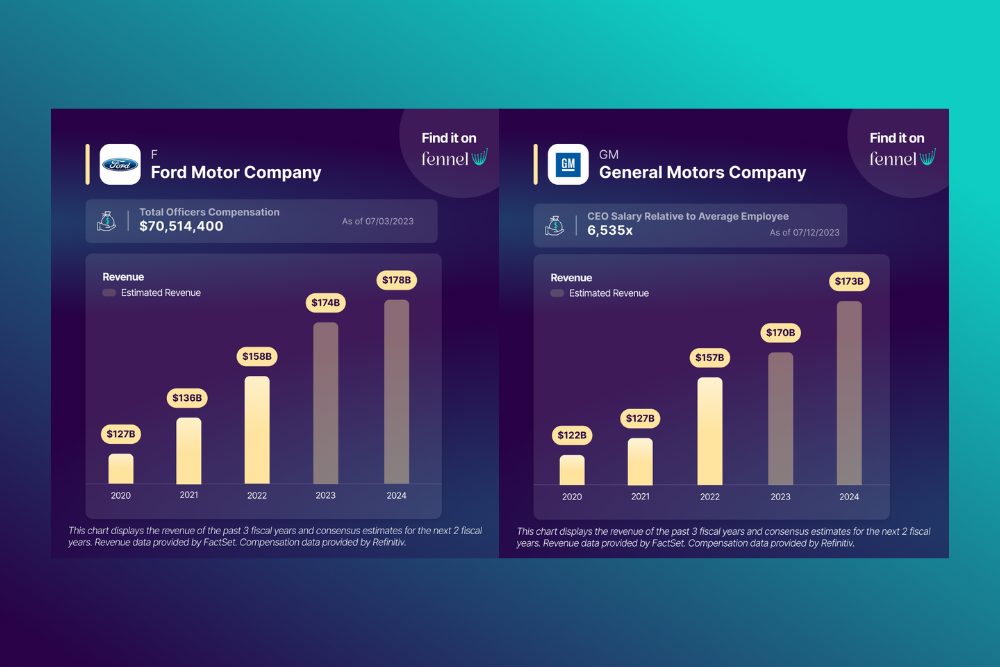 Back to Learn page
Back to Learn page

UAW Strikes Prolong Amid Tensions with Big Three Automakers
The United Auto Workers (UAW) strike against the Big Three car companies—Ford, GM, and Stellantis—has extended into its third week. As of this writing, over 25,000 of the 146,000 UAW members at these companies are involved.
The UAW has been steadfast with its demands, which include:
∙ Restoring COLA (Cost of Living Adjustments)
∙ Defined benefit pension for all workers
∙ Re-establishing retiree medical benefits
∙ Ending abuse of temp workers
The demands also include a 36% wage increase over a four-year contract. So far, companies have yet to fully meet the UAW demands, only offering about 20% in wage increases.
Fair pay is one the main issues of the strike, due to the fact that CEO pay at the Big Three has increased 40% over the last four years. Over the past 20 years, auto workers’ real wages have actually decreased by 20% when factoring inflation.
Both Ford and GM’s CEOs have publicly criticized the UAW’s handling of the strike. GM’s CEO Mary Barra claimed, "It’s clear that there is no real intent to get to an agreement.” However, auto companies’ profits continuously reach record levels, increasing 92% over the past 10 years — in that time, nearly $66 billion was paid out in shareholder dividends and stock buybacks.
The UAW has adopted a targeted walkout strategy, initiating strikes at select plants and escalating from there. Stellantis facilities were spared in the latest round of strikes because of progress made in negotiations, including cost-of-living adjustments and an outsourcing moratorium — showing the labor union’s willingness to cooperate when demands are met.
The protracted negotiations signify an industry at a crossroads, facing rapid technological changes and global competition. If a full strike occurs, it may cost an estimated $400-500 million in weekly revenue losses for each company.
The current standoff between the UAW and the Big Three contributes to a pivotal moment for labor relations in the US. At the same time, writers in Hollywood recently wrapped up their strike while actors continue to picket, and airline workers prepare for a potential strike of their own.
Read more: The Financial Stakes of Hollywood’s Strikes
Questions for Retail Investors to Consider:
∙ How will striking workers affect the bottom line of these companies?
∙ What industries do you think are most susceptible to worker strikes?
∙ Will companies that got by on cheap labor in the past have to pay for it in the future as more workers strike?
∙ ∙ ∙
The companies shown in inset infographics are included because of their relevance to ongoing strikes. The purpose of these infographics is to demonstrate the information provided in the Fennel app for a $4.99/mo. subscription, along with how this information relates to current events.
The views expressed are those of the author at the time of writing, are not necessarily those of the firm as a whole and may be subject to change. The information contained in this advertisement is for informational purposes and should not be regarded as an offer to sell or a solicitation of an offer to buy any. It does not constitute a recommendation or consider the particular investment objectives, financial conditions, or needs of specific investors. Investing involves risk, including the loss of principal. Past performance is not indicative or a guarantee of future performance. We do not provide tax, accounting, or legal advice to our clients, and all investors are advised to consult with their tax, accounting, or legal advisers regarding any potential investment. The information and any opinions contained in this advertisement have been obtained from sources that we consider reliable, but we do not represent such information and opinions are accurate or complete, and thus should not be relied upon as such. This is particularly true during periods of rapidly changing market conditions. Securities offered through Fennel Financials, LLC. Member FINRA SIPC.

Expand your knowledge further

Intrapreneurs create innovation from within their company.

What does impact investing look like in practice?

Social impact doesn't always happen in a vaccum.

Corporate Social Responsibility is a hot topic nowadays, but how does it actually benefit companies?

Want to invest in bonds while having a positive impact on the world?

The Tax Cuts and Jobs Act of 2017 helped create a new type of impact investing.

Equity crowdfunding allows more people to participate in early stage startup investing.

A growing number of future business leaders are learning about sustainability in their MBA programs.

The 17 SDGs represent aspirational goals that span a range of economic and societal issues, with the intention of providing a better future for all.

Does it make more financial sense for studios to meet the writers’ and actors’ demands, or not?
Take back the power of your investment
